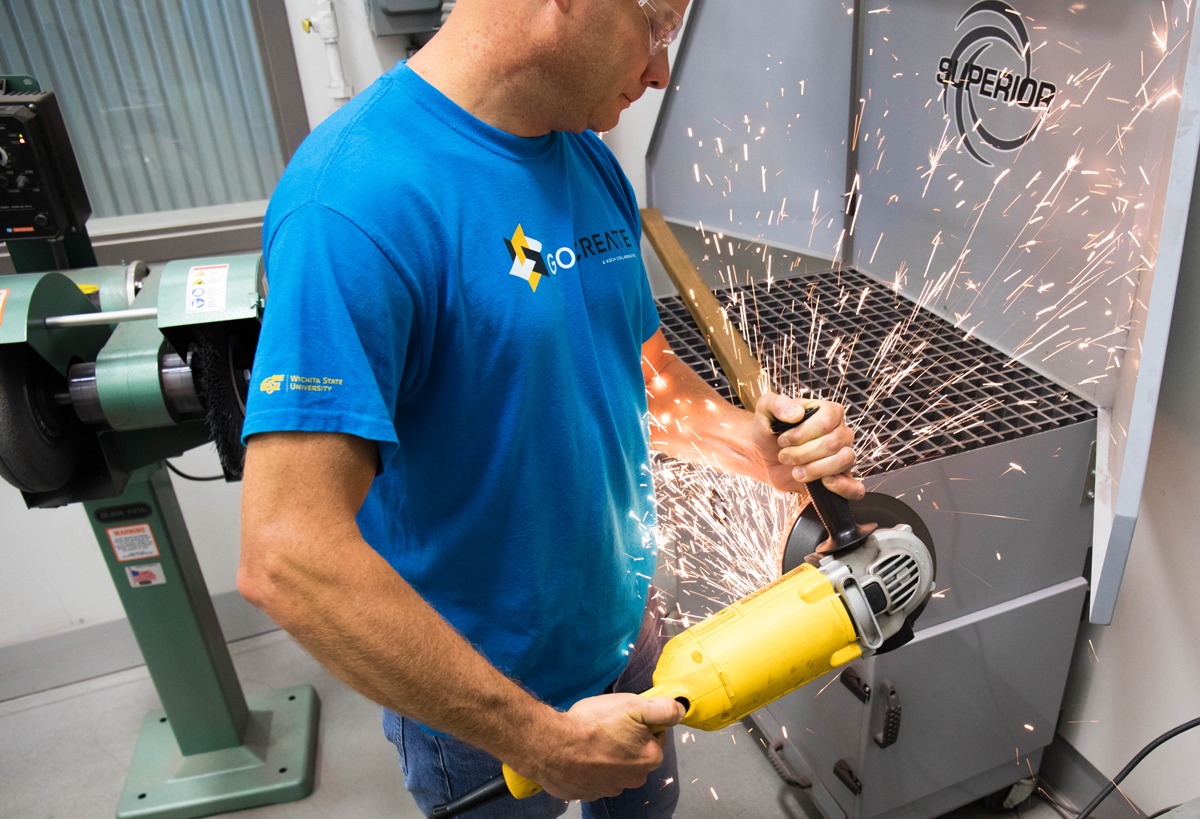Entrepreneur Todd Gentry knew he needed equipment and guidance. A 3D printer, a laser cutter and a garage door would help, too.
“You can wheel big stuff in here,” he said. “You don't find that everywhere.”
As GoCreate marks its second year, that access to tools, technology and advice is critical to Gentry and others. Gentry, from Winfield, is founder and CEO of HyperBorean and has been a member of GoCreate, a Koch Collaborative, using its studios and equipment, for the past nine months to push his product from idea to commercialization in an economical fashion.
“Investors don't like science projects,” Gentry said.
HyperBorean calls itself a “cleantech” company and its products attempt to use heat (typically waste heat) as an energy source to power air conditioning and refrigeration. Gentry is working on prototypes to cool automobiles and small buildings such as mobile telecom equipment structures.
He reached the point where he needed a prototype to show investors to move past the “science project” phase and show off equipment.
“We've come through a really long slog of research and development,” he said. “It's all been theoretical work to date.”
Gentry and Patrick Hosty, HyperBorean's business developer, are also working with WSU Ventures. They see Wichita State's resources and community as offering a series of advantages.
HyperBorean
“The ability to cross-connect and cross-pollinate within the university's eco-system is phenomenal,” Hosty said. “We can meet with WSU Ventures and get further development contacts – ‘We know the guy doing this and the girl doing that and you guys should talk to each other because your widget can help her gizmo and together you can be even better,' which was a great conversation.”
GoCreate's facilities speed up the HyperBorean timeline and cut costs.
Gentry researched companies to build a prototype and a control system. The estimated costs, he said, came back around $120,000 for each part of his plan.
“We were looking at a quarter of a million dollars just to get a working model built,” he said.
About that time, Gentry talked with Debra Franklin, Wichita State director of university strategic university initiatives. Franklin pointed him toward GoCreate in the Experiential Engineering Building at 4000 E. 17th St. N on the Wichita State campus.
“A very fortuitous encounter,” he said.
Nine months later, HyperBorean is moving toward commercialization at a price tag significantly less, thanks to Gentry's eight-hour days in GoCreate. GoCreate, he said, allowed him to add staff and focus on commercialization instead of scrambling for funding.
“By creating the physical pieces by myself here, I've gone from $120,000 cost for a prototype to under $10,000,” he said. “GoCreate's been a game-changer for us.”
Accelerating innovation
GoCreate mentor Bill Carey is part of changing the game for HyperBorean. Carey, an electrical engineer, helps Gentry create a micro-controller.
“The goal is to teach them how to teach themselves and to be able to take off and explore on their own,” Carey said. “His technology has a lot of nuances, has definite commercial potential. GoCreate is a great avenue to be able to (fabricate) things and test things without spending a lot of money internally. It's really interesting understanding his needs and the things he needs to control.”
Carey describes his job as “feeding the vision” of people who come to GoCreate. Some people want to complete a project for personal satisfaction. Others are looking to develop a product to sell.
“Somebody comes along and says ‘Hey, I really want to do this,” he said. “It's helping them to see how to work on it in a way that would be most meaningful to get them to their goal. Is it something they want to set in a corner or is it something they want to sell?”
Gentry uses GoCreate's metal and wood shops frequently. He used the 3D printer to make a fan shroud and pieces that cradle the circuit board. He plans to use the laser cutter soon. HyperBorean's prototype will weigh around 400 pounds, which is why Gentry appreciates GoCreate's 10 by 12 garage door that allows him to wheel it in and out.
“There's not much in the facility I haven't been trained on,” he said. “It's given me the advantage, also, of having the intimate understanding of how each of these pieces were built, how it's were assembled, how they interact with each other. So, as it comes time to trouble-shoot and test – I'm the one that built it.”


 Alyssa Calbert
Alyssa Calbert